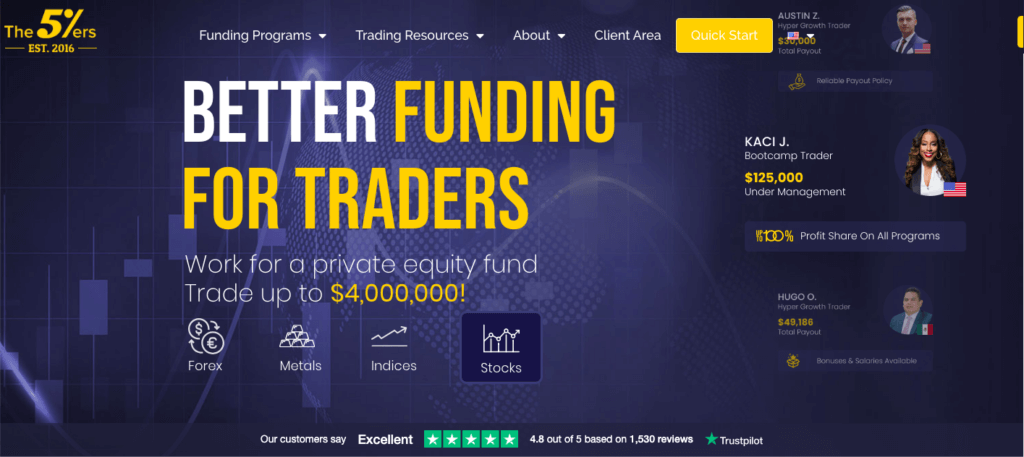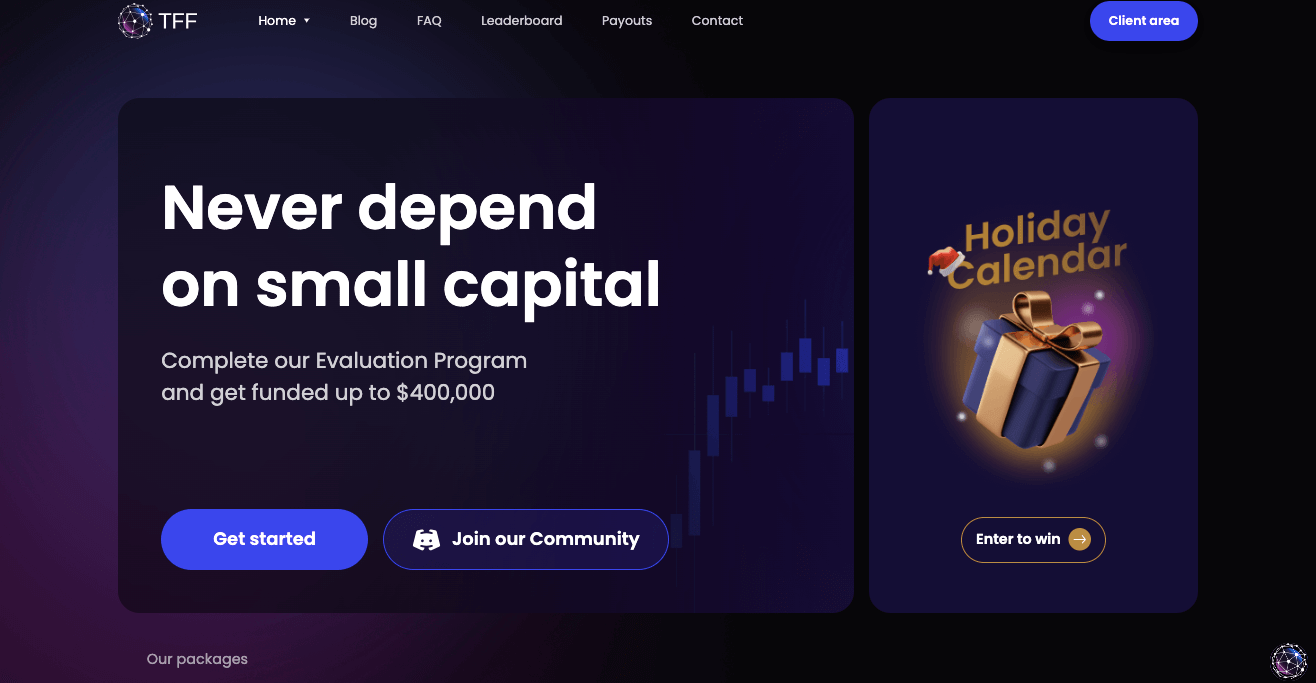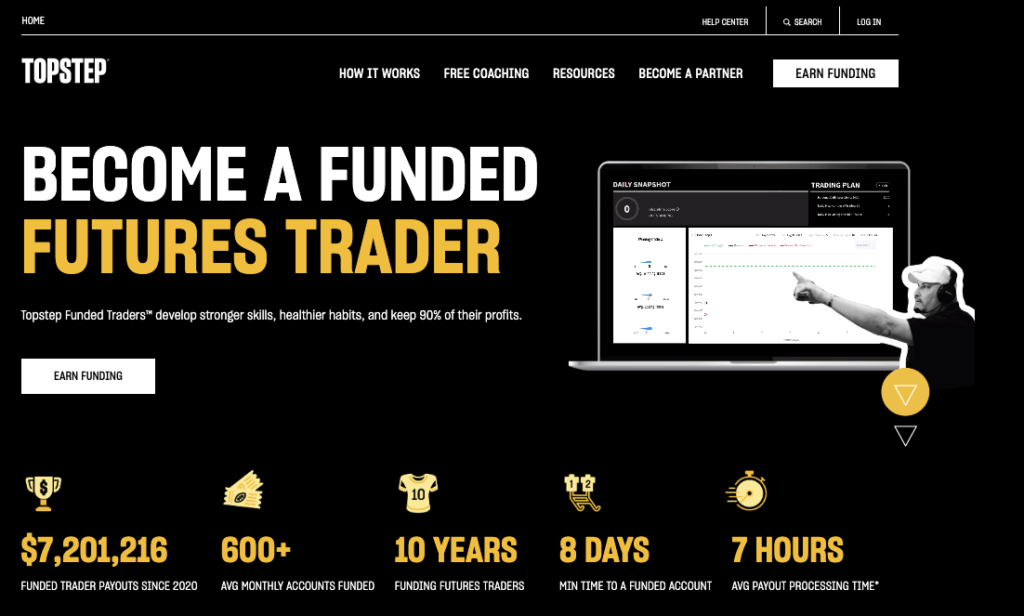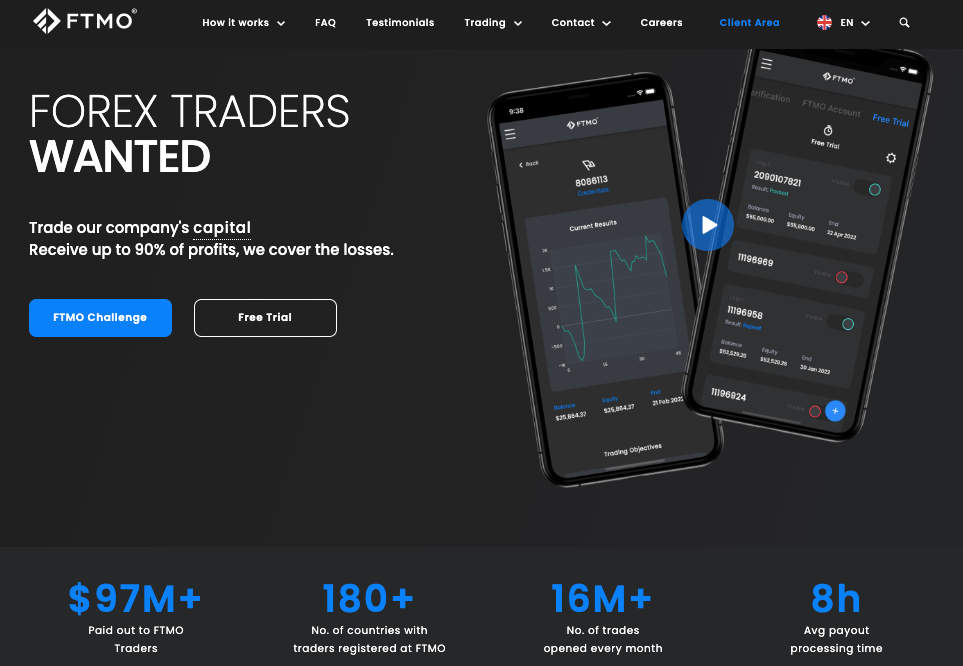
Proprietary trading firms are a great way to fund your trading strategies and maximize your profits. Which prop firm is best for you depends on a number of factors, but affordability is very important.
Here are some of my favorite current discounts, coupons, and promo codes offered by leading prop firms. I update these every day, so check back frequently.
Table of Contents
My favorite proprietary trading firms
These are four of my favorites, three of which are offering great promotions right now. For further analysis of the best prop firms, please read my full article: Best Proprietary Trading Firms for 2024.
Topstep Futures
If you really want a future as a trader, look no further than Topstep. Not only are they offering traders up to 70% off at the moment, they are also the gold standard when it comes to prop trading. No one offers more coaching and more educational resources than Topstep. They even offer a live trading room via TopstepTV five days a week.
Topstep has been in the business forever and has funded thousands of traders, paying out millions of dollars in the process. And speaking of payouts, Topstep pays out 100% of your first $5,000 in profits and 90% thereafter. You won’t do better than that. If you want to start your prop trading career with the best of the best, take advantage of the 70% off and sign up with Topstep today.
The 5%ers

For forex traders, the 5%ers is amongst the safest, most reliable prop firms in the world. There’s no one I’d trust more, and they are one of the few prop firms that still offer real capital to funded traders.
They also have the best payouts in the industry — successfully trade with them for long enough, and the 5%ers will reward you with 100% profit splits. They’ll also scale you up in a hurry, and put very few limitations on your trading style.
New traders will be thrilled with the 5%ers educational resources and affordable account options, and veteran prop traders love their simple trading parameters.
The only significant downfall to the 5%ers is that they don’t offer many discounts, but when your product is this good, you really don’t have to. That said, they’re giving 5% off to my readers, so take advantage and join the most reliable forex prop firm in the world.
FTMO
FTMO has been listed amongst the best prop trading firms for what seems like forever. They rarely offer promos because, for the most part, they don’t have to. FTMO’s reputation in the prop trading world is absolutely unassailable. They’ve paid out nearly $100 million over the years, funded tens of thousands of traders, and have traders in more than 180 countries. How many countries are there in the world? That seems like almost all of them!
FTMO is so popular because they’re affordable, offer a lot of tradable assets, and have great trading apps, but, most of all, because they have earned their reputation as the world’s most dependable prop firm.
If you value reliability more than anything, sign up with FTMO, the most trusted prop trading firm in the world.
True Forex Funds

True Forex Funds has emerged as a solid alternative for those who have been scared away from using US-based prop firms like the Funded Trader. TFF is based in Hungary, so they’re immune to any CFTC interference.
TFF offers one-phase or two-phase evaluation programs, with generous max and daily loss limits (10% and 5%, respectively), and obtainable profit targets. There are no minimum trading days or a time limit for their two-phase evaluation accounts. They also allow traders to hold positions over weekends, even if you’re trading crypto. EA’s are allowed, and in general, trading rules are pretty lax.
Profit splits are 80/20, and all evaluation fees are fully refundable once you become a funded trader. TFF offers bi-weekly payouts via multiple methods.
TFF paid out over $40 million to traders in 2023, and are as legit as they come. I’ve heard a few complaints about excessive slippage, but haven’t experienced anything too egregious myself. They’re a good option for those looking for a prop firm that’s a little cheaper than FTMO.
Sign up with True Forex Funds, prove your trading strategy, and you could soon be trading up to a $2.5 million account.
What is proprietary trading?
Proprietary trading occurs when a person or a firm trades its own money. There are a few different types of firms that engage in proprietary trading, but the ones we’re talking about all offer funded trading programs.
Funded trading programs work like this with most firms: you or any other trader signs up with a prop trading firm and selects an account size, usually anywhere from $5,000 all the way up to a $1 million. You will pay a fee, probably between $100 for smaller account sizes to more than $1,000 for the million dollar accounts. Then you undergo a trading evaluation, which is often two steps. You have to prove that you can meet profit targets and abide by the firm’s trading rules. If you do that, you become a funded trader, and the firm gives you the amount of capital you signed up for.
Once you’re a funded trader, you still have to abide by the firm’s trading rules or they’ll take away your account, but you get to split any profits you make, taking home up to 90%. If you lose money, it comes out of the firm’s pocket, but you’ll lose your account.
Is proprietary trading legal?
Yes, proprietary trading is legal! People think it’s not due to the Volcker rule, a law that came out in response to the 2008 financial crisis, but that rule applies only to banks, not individuals or prop trading firms.
The 2008 financial crisis was caused, in part, by banks that were investing their money in derivatives like mortgage-backed securities, many of which weren’t nearly as safe as advertised. When the housing market burst, the mortgage-backed securities lost a ton of value, which sent some prominent banks into bankruptcy.
In order to prevent that in the future, US regulators enacted the Volcker rule, which made it illegal for banks to engage in proprietary trading. So proprietary trading is only illegal if you’re an employee at a bank, have access to the bank’s capital, and start trading it on the bank’s behalf. If that doesn’t describe you, congratulations, you are free to engage in proprietary trading!
Is prop trading legit?
Yes! Prop trading is perfectly legit. People have their doubts because it seems too good to be true, but yes there are firms that will give you capital to invest, split any profits you might make, and take on any losses. The catch? You have to trade by their rules, you have to meet certain profit targets, and you have to pay an up-front fee.
Is proprietary trading regulated?
No, it’s not. Prop trading firms occupy a sort of gray area that doesn’t fall under regulatory oversight. This may be changing, however. For years, prop firms have claimed y are not broker/dealers, since they are not buying and selling real securities on anyone else’s behalf. This would, theoretically, mean that they do not fall under the watchful eye of the SEC, NFA, CFTC, FINRA, or any other financial acronym in the US.
Things changed this past August, however, when the CFTC shut down My Forex Funds, one of the most popular prop firms in the world. The CFTC contended that MFF was indeed acting as a broker dealer, even if all trading was simulated. So far, one judge has agreed with this opinion. If his opinion stands, the CFTC will no doubt require all prop firms to submit to regulation.
How do I choose a proprietary trading firm?
There are many considerations to make when you choose your prop trading firm. Some of these will matter more to you than others, depending on your priorities, trading style, and pocketbook.
Cost
You probably found this article by searching for prop firm promo codes or coupons, so obviously cost is a priority for you, as it should be. Of course, cost isn’t the only factor, and it is often as true with prop firms as it is with anything else—you get what you pay for. Best-case scenario, you find a great prop firm offering a great deal (looking at you, Topstep).
Trading style
Since prop trading firms are putting their own capital on the line, many make limits on the trading styles they permit. For example, some prop firms don’t allow swing trading or trading around important news releases. Others don’t allow copy trading or EAs. It all depends, so make sure your trading style of choice is offered by your firm.
Trading parameters
This is a big one. If you take away one thing from this article, let it be this: understand your prop firm’s trading parameters before you sign up.
Usually, the most important parameter is the max loss. All prop firms make limits on how much you can lose before they take away your account. Makes sense, right? No prop firm wants to keep throwing money at a trader who keeps losing it.
Abiding by a loss limit seems simple, but how prop firms calculate your maximum loss can get complicated and trip a lot of traders up. Some firms just say you can’t lose more than a certain percentage of your opening balance. That’s easy to understand, but other firms have a trailing maximum drawdown, so you can only lose a certain percentage of your highest balance level.
Prop firms also often have a daily max loss and an overall max loss, which may also be calculated differently. Make sure you know how they calculate your maximum loss!
There are other parameters beyond max loss. A lot of prop firms require stop losses on every trade, for example. Some limit trading style. Some put limits on lot sizes. Some require you to close out positions every night. The point is, there’s usually a lot of rules. Understand all of them, before you start trading, or you could lose your account in a hurry.
Profit splits
Different prop firms also offer different splits. In general, prop trading companies that offer instant funding without any sort of evaluation split profits 50/50 with their traders. There’s a little more variance among those firms that evaluate their traders first, but typically payouts fall between 70%–90%. Some firms, like Topstep, will pay you 100% of your profits at the beginning, before dropping to 80% thereafter.
Scaling opportunities
Prop trading firms want to give their best traders the most money, for obvious reasons. In order to do that, many of them have a scaling plan in place. That plan is determined by your continued adherence to the firm’s trading rules and your ability to hit profit targets. If you continue to hit your profit targets without violating the rules, you’ll continue to get more money, often all the way up to $2 million or so (or $10 million if you’re trading with Lux Trading Company).
That sounds great, and it is, but be sure to read the small print. Some firms want to take a much longer look at their traders before entrusting them with more money, so always check the minimum trading days they require before they’ll bump up your capital.
Reputation/trustworthiness
You have a lot of time and money at stake, so it’s obviously important to find a funded trading program you can trust. Unfortunately, there are some bad actors in the prop trading world, so you have to be careful.
The most obvious way to weed out some of the less-than-reputable prop firms is to eliminate any of them that don’t have a proven track record. In general, prop firms that have been in business for a while have stuck around because they are actually funding traders, making their payouts on time, and not trying to undercut their traders. There are exceptions, of course (like Maverick Trading, a prop firm with an abysmal track record that somehow ensnares new traders year after year), but looking at longevity is a good place to start.
With newer prop firms, it is important to look for proof of payouts, which you can often find on YouTube, Instagram, or other social media platforms.
Tradable assets
Many prop traders trade forex, so currency pairs are offered by almost every prop trading firm, but some also offer futures, crypto, metals, shares, or other financial instruments. If you are looking to trade a specific asset, make sure it’s offered by your prospective prop firm before you sign up.
Trading platform
Most prop trading companies offer MT4 or MT5 as their platforms of choice, but thanks to MetaQuote’s recent issues with the Apple App Store, some prop firms are turning to cTrader, TradingView, and others. If you already have a favorite platform, make sure the funded trader program offers it. If not, most trading platforms offer free demo accounts, so fool around with your prospective prop firm’s platform for a while to make sure you’re comfortable with it.
Customer service
Customer service can be very important in the prop trading world, especially if you’re signing up with a firm that has complex trading rules. Not only will a good customer service department help you stay on top of the rules, they can also restore your account should you accidentally be suspended (yes, occasionally even the firms themselves are confused by their own rules).
Good sources to help you determine the quality of a customer service department are TrustPilot, YouTube, and, of course, knowledgeable traders like me.
Evaluations/funding timeline
If you have a can’t-miss trading strategy that requires you to make your move as soon as possible, you should obviously look to the no-evaluation, instant-funding prop firms, like the 5%ers or BluFX. They’ll take a much higher percentage of the profits, but you’ll be in the market in a flash.
If you’re more patient and opt for the better value you often get from prop firms that require an evaluation, it’s important that you look at the minimum trading days. Some prop firms let you pass to the next level the minute you hit your profit target. Others require you to hit your profit target and actively trade over a certain number of days before they will pass you.
Minimum trading days can be anywhere from 1 to 29, which obviously has a huge impact on how quickly you get funded, so make sure you know before you sign up.
Trader education
This is less important for experienced traders, of course, but it’s always important to see how much your prop firm invests in trader support and education. A prop firm that ignores this aspect of the business is probably not a firm looking to build a long-term relationship with its traders. A prop firm that spends a lot of time and money on helping you develop as a trader is a firm that truly wants you to succeed.
Conclusion: My favorite current prop firm promotion
For me, it is all about getting the most value for your dollar. With their outstanding trader support, great educational resources, incredible profit splits (100% of your first $5,000!), spotless reputation, and so much more, I think Topstep’s current 70% discount is a truly great deal.



“The Funded Trader Click for 95% payouts + 125% refund with code TFTFREEDOM95”
This code no longer works.
Hi Hayden, thanks – that promo just ended about 5 hours ago, but I already updated with their new promotions. Happy trading!